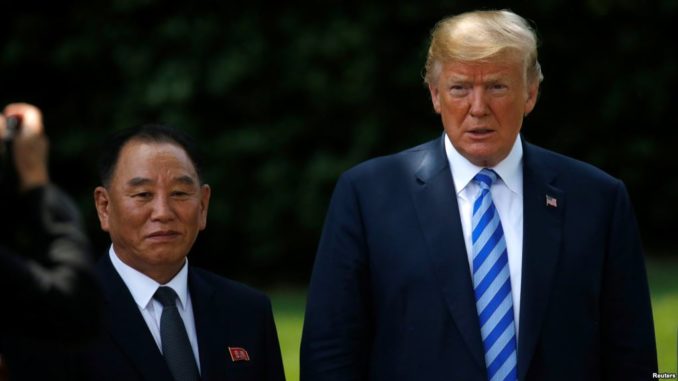
President Donald Trump on Friday said the June 12 summit in Singapore with North Korea was back on, after meeting with North Korean official Kim Yong Chol for more than an hour in the Oval Office of the White House. Dong Hyuk Lee, chief of VOA’s Korean service, weighs in on what we can expect from both sides in the lead-up to the summit between Trump and North Korean leader Kim Jong Un.
Will the Korea summit happen?
“I think so. I think there is a good chance that we’ll have talks as planned in Singapore on June 12th. So that means the overall atmosphere for the talks appears to be quite positive. Does that mean that we can expect outcomes that can satisfy both sides? You know, I think that answers are still not clear. We don’t know for sure whether the planned summit will produce tangible results that North Korea and the U.S. will be satisfied with.”
Will something definitive come out of the meeting?
“I think Mike Pompeo’s statement and President Trump himself, I guess, alluded to a situation where they now realize that, you know, getting North Korea denuclearized may require more time and effort than they have initially thought. So, I think what they are trying to do is — in a matter of months, maybe, not years — but they are trying to find an answer to the fundamental question, and that is whether North Korea is really committed to denuclearization.”
What do you think was in the letter delivered to Trump from Kim Jong Un?
“I mean, as you know, nobody can tell anything, authoritatively, about the contents of the letter, unless it’s made in public. You know, if you speculate based on past experience, I think generally those sorts of letters to the president of the United States contain very general statements assuring commitment to denuclearization in return for some type of a security guarantee.”
Why was Trump’s Oval Office meeting with North Korean Vice Chairman Kim Yong Chol longer than anticipated?
“It’s hard to tell, because the White House and the State Department have been tight-lipped about all details in terms of schedules and venues of the meeting, so this may have been originally planned or this may have been extended. But I think if the talks got extended, I think it’s not necessarily a bad sign. I think it is good for Kim Yong Chol and President Trump to have a lengthy conversation, and at the end of the day, after the talks, Trump made a suggestion that the summit might be back on track.”
What came out of the high-level talks between the two Koreas on June 1st?
“They basically agreed to establish a liaison office in the North Korean border town of Kaesong. That’s the city that hosted the inter-Korean industry park until it got shut down over North Korea’s nuclear missile tests in 2016. They also agreed to resume reunions of families separated by the Korean War, and also they’re going to hold talks on the military. So I think what this means is that there is a lot of movement going on between the two Koreas, but I will say those movements and activities are limited to improving ties in terms of people-to-people exchanges and cultural exchanges, sports exchanges. I don’t think there will be an major economic investment from the South until we see some progress on the nuclear issue and international sanctions are lifted.”
Could human rights issues be a deal-breaker?
“I think President Trump has indicated on multiple occasions that he will bring that issue up when he meets with Kim Jong Un, the North Korean leader. I don’t think it’ll be a deal-breaker as long as the U.S. demands that that issue has to be resolved, or at least has to be dealt with seriously, between the two sides at the summit. … I think what the U.S. is trying to do is they’re trying to focus on denuclearization first, and if those talks are successful, I think they believe there will be a later point where they can raise this human rights issue to the North Koreans. Because, if the nuclear talks go well, I think the natural, sort of logical step we can expect is there might be some type of dialogue for normalizing relations, or at least improving ties between Washington and Pyongyang, and in the process, I think the North Korean human rights issue will be raised.”
Is the end of the Korean War after 70 years realistic?
“I think that, you know, it is something we can certainly anticipate. I don’t think it’s something imminent, though. I mean, we have a number of issues that lie ahead, and with respect to nuclear talks, and you have to have a substantive agreement before you can talk about signing a peace treaty or any type of treaty that needs ratification from the Senate.”